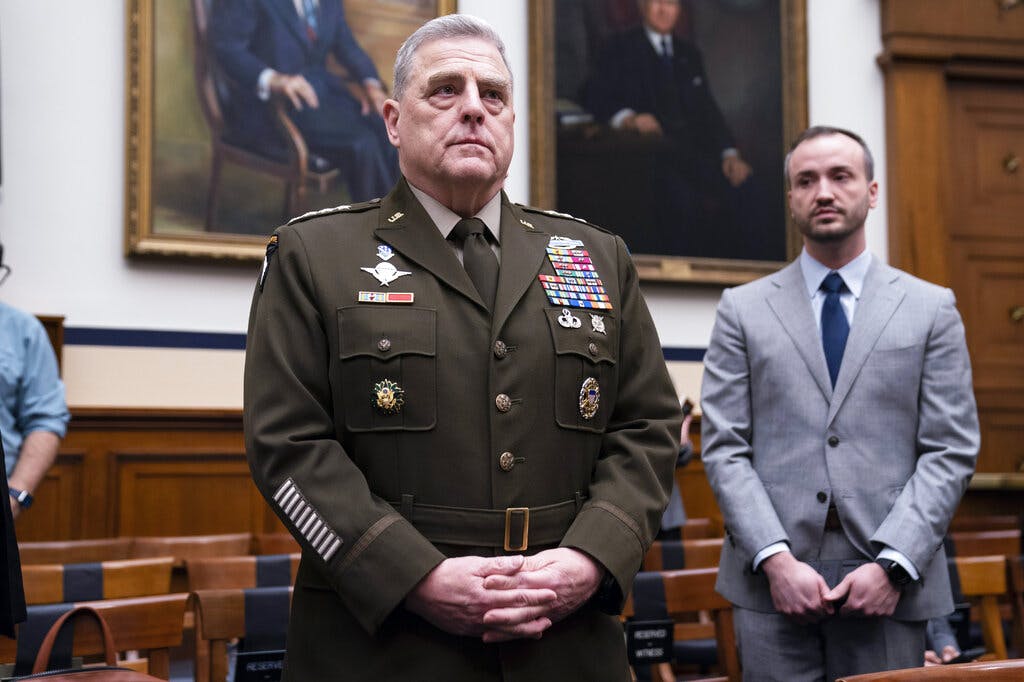Could the Democrats Find a Political Victory by Stepping Up Their Response to Russia’s Attacks in Ukraine?
Disturbing questions are coming to mind about the slowly evolving response of the Biden administration to the Ukraine War.

With all the terrible failure of all of the Biden administration’s policies: millions pouring across the southern border, rampant inflation, soaring crime, complete incoherence on Covid, the Afghanistan debacle, disturbing questions are coming to mind about the slowly evolving response of the administration to the Ukraine War.
It should be clear that the Russians must be disabused of their current daily missile assault on Ukraine’s civil population to which Ukraine cannot retaliate, while shrinking the ground war to the eastern Russian-speaking areas.
Readers will recall that initially the Biden administration, as expressed by that ineffable clarion tribune of contemporary professional militarism, Joint Chiefs of Staff Chairman General Mark Milley, was that the Russians would occupy Kyiv within three days, establish a puppet government (presumably led by former president Viktor Yanukovych whom Russian intervention helped to elect president in 2012), and Ukraine would be seamlessly reabsorbed into Russia within a few weeks.
Accordingly, President Biden publicly offered President Zelensky and his family safe passage when they chose to flee the hopeless cause of Ukrainian independence.
Like most subjects upon which he opines, this turned out quite differently to General Milley’s advice, and the story of the successful and courageous Ukrainian repulse of the Russian invasion around Kyiv and fierce resistance generally are inspiring.
Somehow the general and his subordinates failed to notice that Ukraine, long a large armaments manufacturing center and therefore well-armed in many of the sinews of war, and much strengthened by the Trump administration’s advance of antitank missiles, had a fully trained army larger than the Russian invasion force and a substantially trained reserve that could effectively double the strength of the Army within a few weeks of combat.
General Milley’s error was especially surprising as the United States, along with Canada and several other NATO countries, had diligently trained Ukraine’s army in the most sophisticated contemporary infantry and artillery tactics.
As it soon became clear that Mr. Zelensky was a galvanizing war leader at the head of an almost unanimous people fanatically determined to maintain its independence, General Milley, after a few weeks reconsidered his prediction and now foresees a war of “months or years.”
(Russia’s GDP is smaller than Canada’s and it could not possibly carry on such a war as this for years. This isn’t a Stalingrad-Leningrad struggle for national survival, it’s a bungled imperialist misadventure.)
The naked Russian aggression adjacent to four NATO countries (Poland, Slovakia, Hungary, and Romania), suddenly propelled the Western Alliance into a state of purposefulness not even hinted at since the Soviet suppression of the Czechs in 1968.
In an astounding and uplifting demonstration of the penchant for Germany to make radical alterations of public mood and policy swiftly, the new German chancellor from whom nothing decisive was anticipated in Germany or out, Olaf Scholz, proceeded to the podium of the Bundestag and announced that as a matter of legal obligation Germany would henceforth meet its 2 percent of GDP commitment to defense and would kick the ball off with a €100 billion rearmament program.
Almost all NATO members responded supportively to Ukraine’s struggle; the alliance rediscovered the heart and mind of its founders such as Truman, Eisenhower, Marshall, Acheson, Churchill, DeGaspari, Spaak (Belgium), Pearson (Canada), and Adenauer. The Russian invasion began on February 24, and about ten days later, the official American response began slowly to evolve.
As Ukraine persevered, arms shipments increased. The initial fanfare about sanctions and celebration of the protection of “every square inch of NATO territory” (not one of which was under threat), and mealy-mouthed incoherence about advancing Polish warplanes to Ukraine (“green-lighted” by Secretary of State Blinken, but red-lighted three days later by the Pentagon as “escalatory”) bifurcated into a dual strategy.
The administration continued to use Russian good offices to negotiate American surrender to the nuclear military ambitions of the Iranian ayatollahs (fortunately that shameful enterprise seems to have collapsed for the time being), and Europe initially did nothing to reduce its energy-dependence on Russia, though the born-again Germany may now be leading Western Europe out of that strategic captivity.
Parallel to this respectful accommodation of Russia, though, Mr. Biden boasted unjustifiably about sanctions which had no chance of severely damaging Russia, given that China, India, and many other important countries declined to cooperate with them, and added bellicose flourishes such as his description of President Putin as a “war criminal.”
I may be, to put it in Pentagonese, attritted by the dismal sequence of uniform failures that comprises the Bidenization of America, but I fear there is a slow-motion adoption by the president of the pose of being a dynamic strategic commander-in-chief resolving a world crisis by falling in behind the advancing armies of Ukraine, increasing the range of arms shipments to where they should have been from before the beginning of the conflict, and posing as the Savior of Ukraine and vanquisher of the Kremlin.
All Ukraine needs now apart from more of the same assistance, is the military equipment to reply to Russia’s missile shooting gallery assault on civilians. Mr. Zelensky and his armies have shown their ability to accomplish the rest with relatively minor supplements of arms and munitions from NATO.
Everything else having failed, just as the Democratic strategists saw the potential of Covid to rob President Trump of what appeared to be likely reelection in 2020, they may now see electoral catastrophe-avoidance in rushing belatedly to the assistance of Ukrainian victory. Mr. Biden’s handlers have demonstrated that they are astute enough to make the most of the mindless caterwauling on the right about a bipartisan Washington love of war-making, and all the hand wringing nonsense about Mr. Putin going nuclear.
What is needed is to make the war costly enough for Mr. Putin that he will settle for the Russian-speaking areas of East Ukraine that would probably rather be in Russia than Ukraine anyway and departure of which would strengthen an integral Ukraine. He could call that a victory but the victory would be for the West in adding another important nation of at least 35 million non-Russian Ukrainians to the West and reconfirming the West’s victory in the Cold War and the dissolution of the USSR which Mr. Putin is trying to reverse.
The rabidly Democratic national political press could be relied upon to make the suitable comparison with JFK and the Cuban missiles in 1962. This would be bunk, of course, as there were already short range nuclear tipped missiles in Cuba, the USSR was an approximately equivalent military power to the United States, and it was more an apparent than a genuine strategic victory for the United States as part of the deal was that the parties would not reveal that NATO would remove its intermediate range missiles from Turkey and Italy until after the 1962 midterm elections (which caused, inter alia, the defeat of Richard Nixon as governor of California, a well disguised blessing to his career).
If politically successful, this would be a heavy but affordable price to pay for such a great strategic victory. It could happen and it’s all the Democrats have left, but it wouldn’t salvage their control of the Congress and nothing will save them in 2024.

